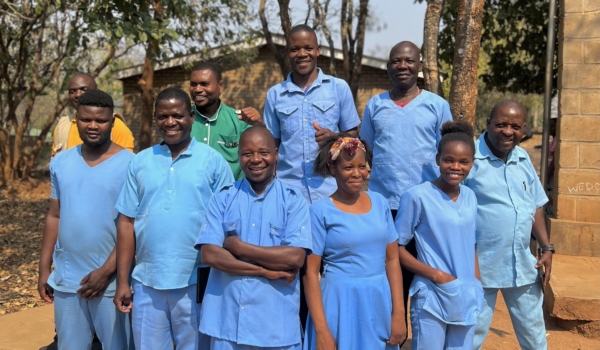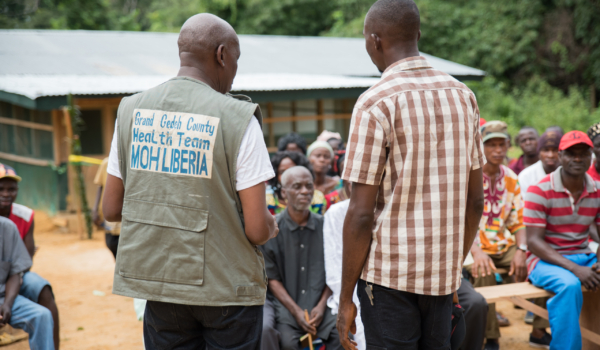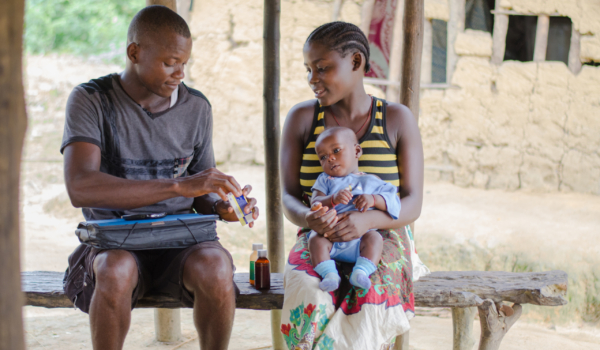S Olasford Wiah, Marion Subah, Brittney Varpilah, Ami Waters, John Ly, Madeleine Ballard, Matt Price, and Raj Panjabi explore how community health workers can be part of the effective response to covid-19.
This piece originally appeared in BMJ on March 27, 2020.
More than 462 000 cases of covid-19 have been reported worldwide as of March 26, 2020— including in 39 African countries. Patients in countries with limited preparedness and resources to respond are particularly vulnerable to covid-19. In countries already facing shortages of nurses, physicians, and other health workers, sharp increases in covid-19 caseloads could overwhelm health systems. We therefore urgently need strategies to rapidly expand healthcare teams and to develop innovative ways to deliver preventive, diagnostic, and management services for covid-19.
In previous epidemics, rapidly expanding healthcare teams through community health workers (CHWs) has proven to be fundamental to an effective response. During recent Ebola virus disease (EVD) epidemics in the Democratic Republic of Congo (DRC) and west Africa, nations like Liberia, Sierra Leone, Guinea, Nigeria, and the DRC rapidly hired, trained, and equipped thousands of CHWs from communities affected by or at risk of Ebola. As part of interdisciplinary teams of nurses, doctors, and other health workers, CHWs played a vital part in reducing transmission through promoting social distancing and contact tracing, detecting and referring individuals with suspected EVD for testing, and encouraging EVD patients to seek care early.
Countries in sub-Saharan Africa are already using CHWs to conduct community surveillance and contact tracing, as well as promoting sanitation and hygiene messages that are critical to preventing the spread of covid-19. Liberia, for instance, is leveraging its National Community Health Assistant Program, which has a strong track record of disease surveillance and expanding routine healthcare delivery, to strengthen covid-19 preparedness and response. We look at the ways in which CHWs can be used to help prevent, detect, and respond to covid-19, with some examples of how Liberia is already doing this:
Prevent
To prevent covid-19, CHWs in Liberia are conducting infection prevention and control measures, explaining and promoting social distancing and organising hand hygiene stations, and educating their neighbors about interrupting disease transmission. Infection prevention supplies, including buckets and soap, are being distributed. Other roles for CHWs in preventing covid-19 include:
- Educating communities about the signs, symptoms, and transmission routes of covid-19. This could also encompass CHWs leading skill building among the community in personal preventive measures, such as physical distancing, hand hygiene, coughing into elbows, and WASH interventions.
- Organizing hand hygiene stations in communities and health facilities and mobilizing local residents to use them.
- Supporting, leading or reinforcing community and facility based infection prevention and control measures, such as the construction of triage areas or use of personal protective equipment (for example, face masks, gloves, gowns).
- Helping health systems and communities to prepare for the eventual introduction of covid-19 vaccines in development, including outreach to high risk groups.
- Sustaining primary healthcare services; for example, vaccinations, integrated community case management of young children with malaria, pneumonia or diarrhea.
Detect
To detect covid-19, Liberia is preparing CHWs, with appropriate personal protective equipment and supervised by nurses, to identify the signs and symptoms of covid-19 among community members, as part of Liberia’s community event based surveillance system. The Ministry of Health may involve them in coordinating the safe collection of samples for testing, with support from outreach nurses. Other countries can also employ CHWs in efforts to detect covid-19; with the scope for CHWs’ role including:
- Following protocols, designed to ensure the physical safety and health of CHWs and with supervision from nurses, to identify signs and symptoms in community members. CHWs could support the safe collection of samples in communities and health facilities and help rapid transport them to laboratories for analysis, thus reducing risks of nosocomial transmission.
- Where appropriate and available, conducting covid-19 testing.
- Entering alerts into community event based surveillance systems.
Respond
To respond to covid-19, CHWs in Liberia are learning to support patients with mild symptoms who are self-isolating at home, monitor them for any clinical deterioration, and organise rapid referrals for those requiring hospitalisation. Plans are also underway to provide rapid training on covid-19 to teams of CHWs with supervision from nurses. CHWs will be equipped with appropriate personal protective equipment and the skills to use it so that they can trace and monitor the contacts of patients with confirmed covid-19. We’d suggest that CHWs can play a part in responding to covid-19, which could take the form of them:
- Communicating rapidly and effectively to residents in covid-19 areas, including taking the time needed to communicate health information in a tailored and relevant way and combating the spread of misinformation.
- Supporting patients who are self-isolating and monitoring them in the community while ensuring delivery of food, social, and medical support.
- Monitoring patients for clinical deterioration and supporting the rapid referral of individuals who require hospitalization, reinforcing links between the health system and communities.
- Supporting contact tracing, symptom reporting, and monitoring the contacts of patients with covid-19 to ensure access to testing and treatment for those who develop signs and symptoms.
- Implementing or supporting the disinfection of high risk surfaces in communities using appropriate infection prevention control supplies and procedures.
Finally, in areas where community level transmission increases and overwhelms healthcare facilities with covid-19 patients, there is a risk that routine health services will be interrupted, leading to excess mortality and morbidity from non-covid-19 causes. CHWs can sustain primary health care services if care protocols are updated (e.g. by introducing physical distancing and using appropriate PPE during patient encounters) so that CHWs remain safe, well supervised, and at reduced risk of transmitting covid-19.
The time to prepare is now. Liberia is not alone. In March, a global coalition of 16 organizations working with governments from Haiti to Mali to Nepal issued a position paper and offered technical resources to guide governments seeking to optimally engage CHWs in fighting the covid-19 pandemic. Governments can mobilize financial resources for covid-19 preparedness by channeling prevention, detection, and response interventions through existing community health workforces. Where additional investments are needed to leverage community health workforces for the response effort, countries can make use of covid-19 funds available from the Global Fund, World Bank, Bill and Melinda Gates Foundation, USAID, and other philanthropic organizations. As with past epidemics, an effective covid-19 response will benefit from having resilient health systems, which are rooted in communities that can be relied upon in times of crises.
Acknowledgement: We would like to thank Giorgio Cometto and Catherine Kane for their valuable feedback on this manuscript.
- Olasford Wiah is Director of Community Health Services at Liberia Ministry of Health.
- Marion Subah is Country Director at Last Mile Health in Liberia.
- Brittney Varpilah is Director of National Community Health Services at Last Mile Health in Liberia.
- Ami Waters is medical director at Last Mile Health and Assistant Professor at UT Southwestern Medical Center in Dallas, Texas.
- John Ly is medical director at Last Mile Health and Assistant Professor at UCLA Medical Center in Los Angeles, California.
- Madeleine Ballard is Executive Director of the Community Health Impact Coalition and Assistant Professor at Department of Health System Design and Global Health at the Icahn School of Medicine at Mount Sinai in New York.
- Matt Price is Director of Strategic Partnerships at Last Mile Health.




